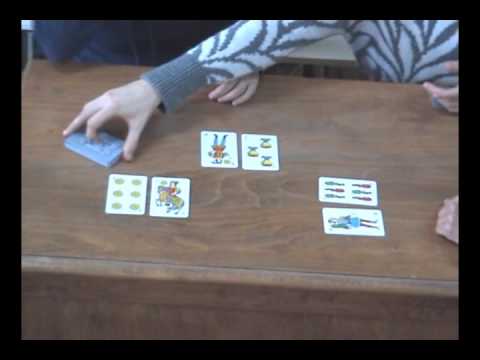Italian Card Game – Sette Mezzo – Seven and a Half
Italian Card Game
Seven & a Half
Sette Mezzo
This is the game we used to play on New Years Eve with all the family as we waited for the ball to drop.
Do you remember or did your family ever play this game? It is actually a version of black jack that we used to play using ceci beans or pennies. Everybody joined in. Parents, Grandparents, all the kids…. everybody.
Sette e mezzo (Italian for “seven and a half”) is an Italian comparing card game similar to blackjack. It is traditionally played in Italy during Christmas holidays. The game is also known in English as Seven and a half.
Sette e mezzo is played with a 40-card deck, a standard deck with eights, nines, and tens removed. The value of cards ace through seven is their pip value (1 through 7), face cards are worth 1⁄2 point each. Players compete against the dealer, but not against each other. The objective of the game is to beat the dealer in one of the following ways:
-
Get 71⁄2 points on the player’s first two cards (called a reale or natural), without a dealer natural 71⁄2;
-
Reach a final score higher than the dealer without exceeding 71⁄2; or
-
Let the dealer draw additional cards until their hand exceeds 71⁄2.
The score of each player’s hand is calculated by adding the points of their cards.
Players must bet before receiving their first card, which is dealt face down. After receiving it, they must decide whether to stand (end their turn) or hit (receive another card). Players may stand or hit as long as they do not go bust (exceed 71⁄2). When a player goes bust they must show their face down card and immediately lose their bet, regardless of whether the dealer goes bust later. When a player achieves 71⁄2 they must announce it and show their face down card.
After all players had their turn, the dealer shows their face down card, then plays with the same rules as the other players. If the dealer goes bust, they must match the bet of all players who didn’t go bust. If the dealer doesn’t go bust, all players must show their face down card. The dealer wins against all players who scored lower or tied, collecting their bets, and loses against all players who scored higher paying them back 1:1. Whether a player with a natural 71⁄2 beats a dealer with a regular 71⁄2 depends on the variant being played.
If the role of dealer is not fixed, it is handed over in the direction of play after each hand. The new dealer shuffles the cards before dealing them.
In the Italian variant, the king of coins (or diamonds) is a wild card and may take the value of any other card at the discretion of the owning player, as long as the player has at least two cards in their hand. If it is the only card in the player’s hand, it is only worth 1⁄2. When playing with this variant, it is usually required to shuffle the cards at the end of the hand the wild card was dealt in.
A common variant includes the rule that a natural 71⁄2 is paid 2:1 and the player who made it becomes the dealer (skipping the regular rotation). If two or more players make 71⁄2 at the same time with only two cards, the player closest to the dealer’s right becomes the new dealer. If the dealer makes a natural 71⁄2, they’ll keep being the dealer for the next hand as well, and players might be required to pay double their bet (unless they obtained a natural 71⁄2 themselves).
A rarer variant mixes the previous two: when a natural 71⁄2 is achieved with the face card being the wild card, it is paid 3:1. Again the players might be required to pay triple their bet if the dealer makes such a hand.
Yet another variant involves the dealer putting an ante in the pot and then playing a single hand against each player in turn. The amount of money currently in the pot is the betting limit for the current hand. If a player wins, they collect their winnings from the pot, if they lose the bet stays in the pot, therefore the limit will be different for each player. After all players had their turn, the dealer collects the amount left in the pot.
This site contains product affiliate links. We may receive a commission if you make a purchase after clicking on one of these links.


